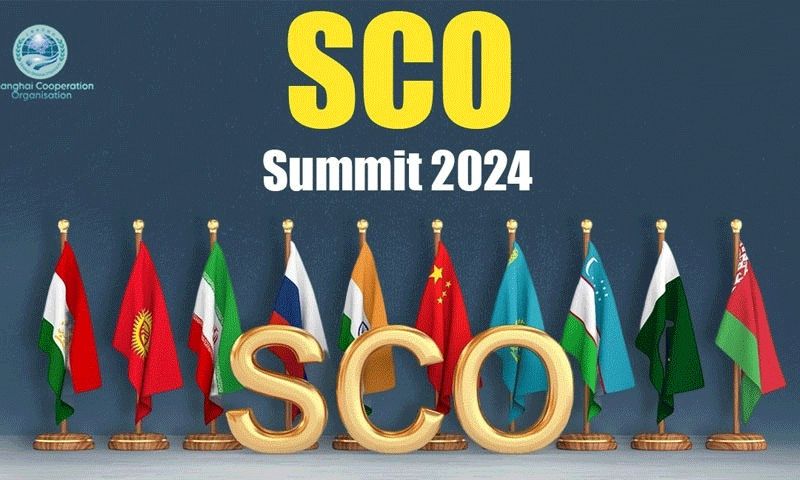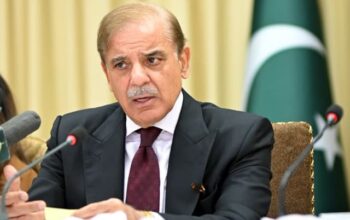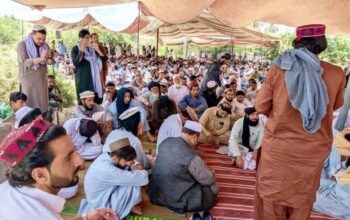By Staff Reporter
ISLAMABAD: Regional leaders convened in Islamabad on Tuesday for the 23rd Shanghai Cooperation Organisation (SCO) summit, bringing together China, Russia, India, and five Central Asian nations to discuss economic cooperation, security, and regional issues.
Pakistan Prime Minister Shehbaz Sharif chairs the two-day summit, attended by Chinese Premier Li Qiang, Belarus Prime Minister Roman Golovchenko, Kazakhstan Prime Minister Olzhas Bektenov, Russian Prime Minister Mikhail Mishustin, Tajik Prime Minister Kohir Rasulzoda, Uzbek Prime Minister Abdulla Aripov, Kyrgyzstan’s Chairman of Ministers Cabinet Zhaparov Akylbek, Iran’s First Vice President Mohammad Reza Aref, and Indian External Affairs Minister S. Jaishankar.
Pakistan assumed the rotating chair of the SCO CHG for 2023-24 at the previous meeting in Bishkek.
Islamabad has been decorated with colorful lights and SCO countries’ flags, while delegates from participating countries have arrived in the federal capital.
However, the city is under tight security due to safety concerns, with many businesses and routes closed. A three-day public holiday has been declared, with schools and businesses shut, and large police and paramilitary deployments.
Army troops secure the capital’s Red Zone, housing key meetings and the diplomatic enclave. The threat alert is high after recent attacks on Chinese nationals, prompting restricted Chinese movement in the city.
On Monday, Chinese Premier Qiang virtually inaugurated the $200-million Gwadar International Airport in Balochistan province. “I believe the new airport will enhance Gwadar’s security, integrate port shipping, and bring investment and trade opportunities to Pakistan’s western regions,” Qiang said.
Qiang emphasized China’s commitment to the China-Pakistan Economic Corridor (CPEC), a network of transport, energy, and infrastructure projects.
“China will continue to work with Pakistan to uphold the principle of planning together, building together, and benefiting together, engaging in open, green, and clean cooperation, and pursue the goal of high-standard people sustainability in order to make the model project of high-quality Belt and Road cooperation.”
Prime Minister Sharif welcomed Premier Li’s remarks. “I want to assure you that I will work with you very closely, not only to promote CPEC’s second phase but also to promote peace and security for the people of China and Pakistan.”
Pakistan and China also signed several memorandums of understanding (MoUs) and agreements to enhance cooperation in various fields, including CPEC Livelihood Working Group, information and communication technology, water conservancy facilities, flood control and disaster reduction, security cooperation, and joint laboratories.
Additionally, agreements on a currency swap between the People’s Bank of China and the State Bank of Pakistan as well as co-production of television programs were reached between the two countries.
“Exchange of MoUs between Pakistan and China in agriculture, commerce, and other fields will shape into agreements very soon through joint efforts of both countries,” Prime Minister Sharif said.
Premier Li also stated that through the concerted efforts of both sides, CPEC had produced significant outcomes and played a positive role in Pakistan’s economic and social development as well as regional integration.
Meanwhile, Pakistan ruled out a bilateral meeting with India during External Affairs Minister Jaishankar’s visit to Islamabad for the SCO summit.
“India’s Foreign Minister has not asked for any meeting, and we haven’t requested a bilateral meeting either,” Pakistan’s Foreign Minister Ishaq Dar told reporters. “He will come as a guest for the SCO, and discussions will be held on multilateral issues.”
Jaishankar’s visit, the first by an Indian Foreign Minister in nearly a decade, comes amid strained ties between the two nations.
Dar assured “full protocol” would be extended to Jaishankar, as is Pakistan’s duty as a “good host”.
When asked about the possibility of discussing trade ties with India, the foreign minister said, “In a broader context, we speak about connectivity and road and rail linkages with many members of the SCO bilaterally. But the mandate of the SCO will be multilateral, and the agenda is fixed.”
He also clarified that while Pakistan discusses initiatives like the TAPI (Turkmenistan-Pakistan-Afghanistan-India) energy pipeline with some SCO members separately, these are not part of the SCO’s discussions.
In March, Dar had expressed interest in restarting trade ties with India, suspended since 2019, but no progress was made. “We would seriously examine” restarting trade ties, Dar had said at the time.
The Indian Ministry of External Affairs (MEA) did not confirm which of the leaders Jaishankar would hold bilateral talks with during the visit.
In 2015, former External Affairs Minister Sushma Swaraj travelled to Pakistan for a Heart of Asia conference, but the visit also saw a bilateral meeting and an announcement of the revival of the Comprehensive Bilateral Dialogue.
Copyright © 2021 Independent Pakistan | All rights reserved




